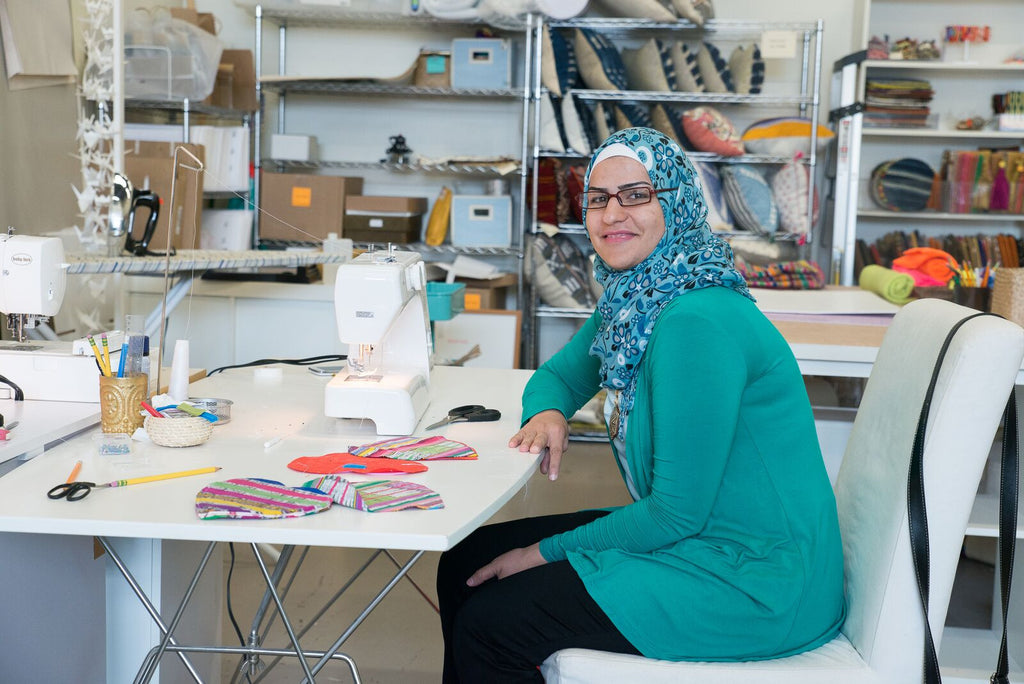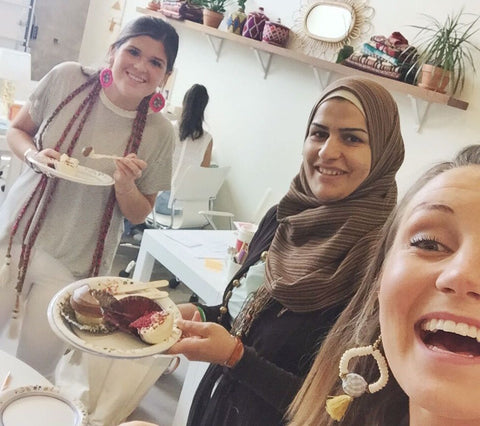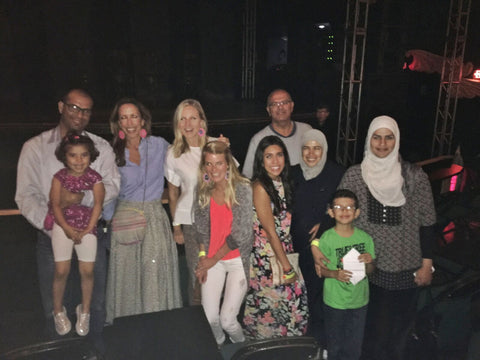Meet Bothina

Imagine packing to go away for a couple of months. You gather your favorite outfits, some shoes, your toothbrush, and few other things. You put them in your bag.
You don’t pack your photo albums. You don’t pack precious family treasures. You just put in the bag what you need to get by. You leave your sentimental items — and even your valuables — at home. You will, after all, be back soon.
That’s what Bothina Matar and her husband, Tamam, thought when they took their two small children to Jordan from their home in Syria in 2013. “We didn’t think we were going forever,” she says. “We thought we would be gone a few months, and everything would be worked out.”
Then a bomb destroyed their house.
Quick Decision
Before the crisis in Syria started in 2011, “it was a good life,” Bothina says, her beautiful, open face belying the horror she has endured in the last five years. “It was a peaceful, calm life. I had my family around. We were happy.”
For two years after the fighting began, Bothina and Tamam refused to consider leaving the country where they were born. Tamam also refused to comply with Syria’s compulsory military requirement. But when the government began to aggressively seek those who had skipped, looking for Tamam by name, they felt they had no choice. “The day before we fled to Jordan, they came to our door,” Bothina recalls. “The next day, we decided to leave.”

Hiding from the government and living in a war zone were tremendously difficult, but things hardly improved after Bothina and Tamam snuck across the illegal border into their neighboring country.
Because Tamam was a fugitive, they could not cross the Syria-Jordan border legally, which meant they were forced into a refugee camp, where conditions were deplorable, Bothina says. “I couldn’t stand it for even one day. It was so horrible. I kept crying. My children were crying.”
And so, in the dark of night, they snuck through wire fences, evaded the Jordanian police, and walked until Tamam’s father, who was living legally in Jordan, could pick them up.
A Call from the UN
For the next couple of years, Bothina and Tamam worked only sporadically in Jordan, which has laws against employing Syrians. They tried to repair their immigration status. And they kept hoping that the war would end and they’d be able to go home. But, Bothina says, “after two years in Jordan, we start to realized that things were more complicated in Syria than even before and that we wouldn’t be able to go back.” To make matters worse, circumstances for Syrians in Jordan were disintegrating. Topping it all off: Tamam didn’t have a passport, and without one he couldn’t leave Jordan.
Then Tamam’s father got a call from the United Nations asking him if he and his wife would like to go to the United States. He said he would, but only if Tamam and his family could go too.

Bothina says they will never know why the UN called her father-in-law; there were a lot of people who had signed up for a transfer with the UN. Because of Tamam’s lacking a passport, “it was the only opportunity for us,” Bothina says.
It took a year after that call for the six of them — Bothina, Tamam, their two children, and Tamam’s parents — to clear rigorous screenings with multiple agencies for the United States, answering hundreds of questions about their lives. They arrived in New York in early December 2015 with the expectation of traveling to Texas right away.
Trouble in Texas
Bothina’s uncle was living in Dallas when she and her family got to the United States. They wanted to be near him. But Texas Governor Greg Abbott said that he would not allow Syrian refugees into the state. That decision, however, was not his to make. The Refugee Act of 1980 gives the federal government alone the power to admit refugees into this country. Try as he would, Abbott could not stop Bothina and her family from moving to Dallas.
That’s not to say that it was easy.
After four days in New York, which Tamam recalls as happy ones, when they felt at last they were safe, they flew to Austin and then drove to Dallas in an effort to avoid media attention.

That was frustrating, Bothina recalls.
“It was confusing, and it was overwhelming,” Bothina says in a video for the International Rescue Committee, an organization that assists refugee families in crisis, and which has resettled all of the refugee women GAIA employs. “We always heard about America as the land of freedom, the land of no racism …”
And yet, once her family was finally in the United States, “I felt like we were stilling running and still hiding. We wanted to start over, but things were holding us back.”

Nine Months Later
Today, life is much more settled for Bothina and her family.
“We left our country because of fear and lack of security, and we came here looking for safety, jobs, and security for our children,” Tamam says in the IRC video.
They have found all of that and more.
In January of this year, Bothina began working at GAIA, where she — alongside her mother-in-law — sews pouches, pillows, and the newly launched Mini Hearts and Mini Kitties for our brand. Tamam is employed at an air conditioning company. The couple lives in Northeast Dallas, where their two children are both enrolled in school. They have made friends.
“I miss home,” Bothina says, “but I am happy.”
And we at GAIA are so happy to have her and the other refugee women who produce our collection. Though we love fashion, these women are why we exist. In the months ahead, we will introduce you to Bothnia’s mother-in-law, Huda, as well as the others who give us our purpose. Stay tuned for more of their amazing stories.
Learn more about about refugee resettlement and how you can help at rescue.org.



Comments on this post (2)
TO Paula and GAIA group and IRC and staff…
I am so amazed and proud of the work that you accomplish IN DALLAS. It is n honor to support you….
— Suzanne Aberly
I am the pa for the In Their Own Voices Refugee Podcast . Tiffany Jelke would like to interview Bothina Martar for the next episode. can some one please email me or call so I can answer any questions and contact Bothina . :) thank you for your time and help.
Michelle McDaniel – Lara
Production Assistant
469-406-8169
mmlara1@outlook.com
— Michelle McDaniel- Lara